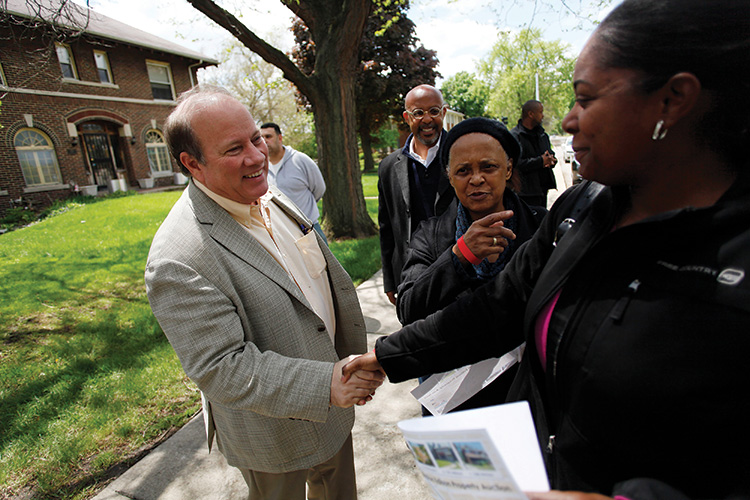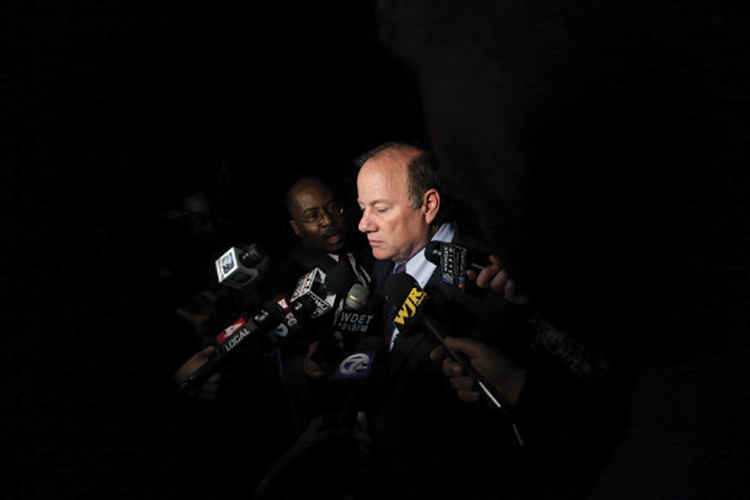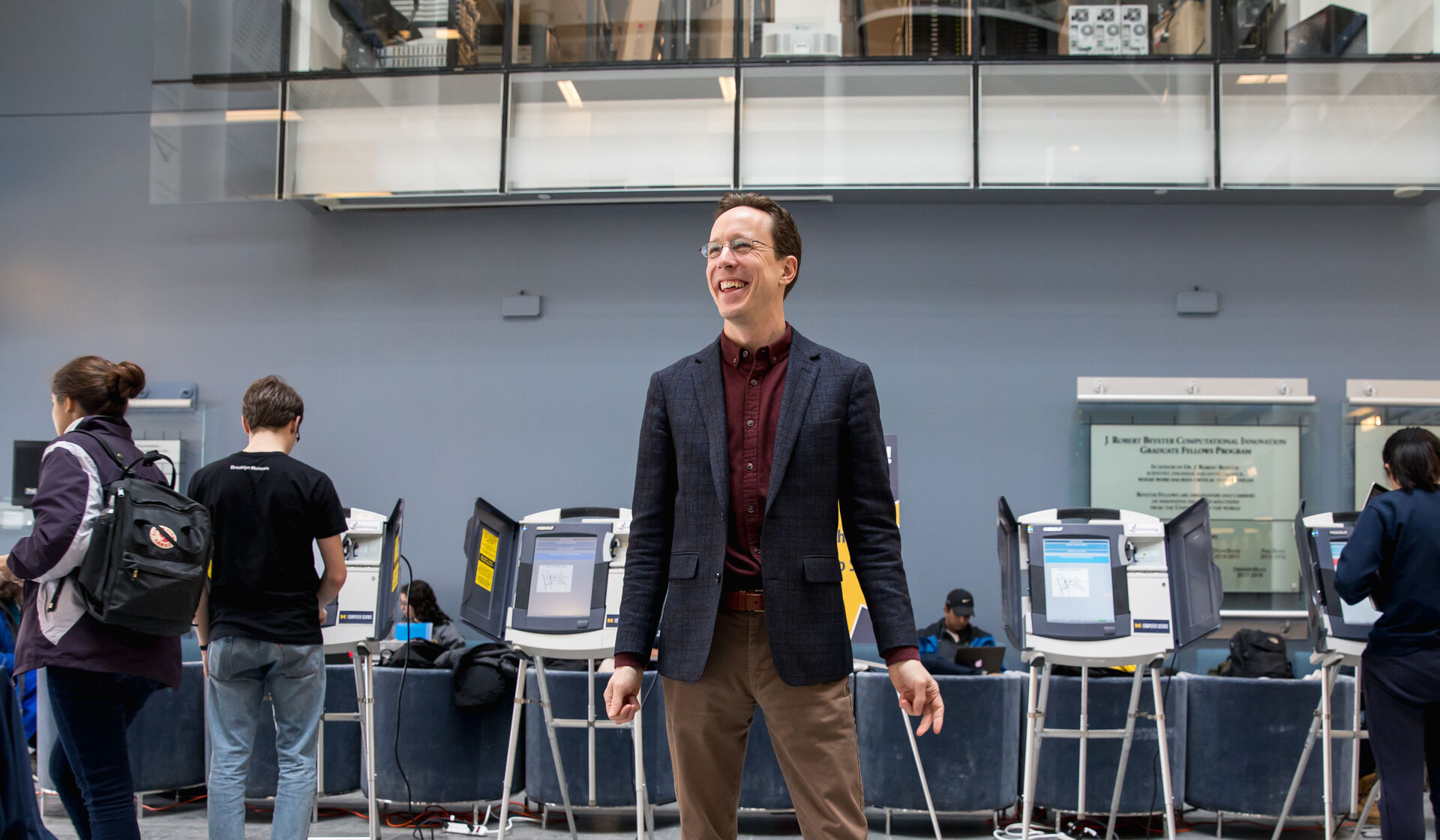Ten years ago, nobody could have imagined Detroiters electing as mayor a balding, stocky white guy from the suburbs.
Today, it is hard to imagine anyone other than Mike Duggan, ’80, JD’83, leading the city. He’s won nationwide acclaim over the past four years for the job he’s done, which has included getting street lights working, demolishing thousands of blighted structures, and managing the city’s exit from bankruptcy.
Perhaps most important of all, he’s changed the national narrative about Detroit—making both residents and outsiders believe in its future again.
“In Duggan, Detroit has found its Fiorello La Guardia,” nationally syndicated conservative columnist George Will wrote this fall, comparing him to the legendary New York mayor. Calling him “a cheerful, plain-spoken incarnation of his city,” Will added that Duggan, “in an unlikely place, might be America’s most accomplishing politician.”
Regardless of that type of praise and his landslide re-election in November, one man isn’t fully satisfied with his performance: Mike Duggan.
“I never get up in the morning and say, ‘Hey, we’re ahead of schedule.’”
But the city is far ahead of where it was—or where anyone expected it would be when he was first elected in 2013. Detroit, which is well over 80 percent black and hadn’t elected a white mayor since 1969, was imploding. Former Mayor Kwame Kilpatrick had gone to prison, and the leadership that followed was ineffectual. City Council was racked by scandal. Gov. Rick Snyder, ’77, MBA’79, JD’82, HLLD’11, appointed an emergency manager. And Detroit entered bankruptcy.
By that point, “people were ready to vote for a purple cow if they thought it could make the cops come when called,” says Sheila Cockrel, a former, highly regarded, city council member.
Voters clearly thought Duggan was their can-do guy. He jumped into the race but was thrown off the primary ballot on a technicality when it turned out he had filed too soon after moving into the city. He then mounted an unprecedented write-in campaign and won the primary. After that, victory over Wayne County Sheriff Benny Napoleon in November was almost an anti-climax.
Duggan then forged a power-sharing partnership with emergency manager Kevyn Orr, ’79, JD’83. Within a year, Orr left, and the city resumed total control. Duggan was a dervish—working nonstop, getting city employees to pick up garbage and mow lawns, and improving bus service and police response times, which fell dramatically.
“You know, those first years, everything was about managing detail. The city bureaucracy had to relearn accountability,” he says.
He also pushed demolition of blighted structures—though he eventually ran into trouble and had to stop for a while for failing to adequately comply with federal and state requirements.
“If I had it to do over, I would have made sure we had a compliance bureau before we did so many demolitions.” He tells his staff he will never fault them “if there’s a job to do and you make a mistake going too fast” to get it done.

Duggan, now 59, began his career at U-M in 1976, when he arrived after graduating from Detroit Catholic Central High School.
Why Ann Arbor? “I don’t remember ever thinking about going anywhere else; I grew up just knowing it was a great school,” says Duggan, a man who isn’t much on introspection. Nor did he doubt which career he’d choose; law was in his DNA. His father, recently retired U.S. District Judge Patrick Duggan, was elected a Wayne County Circuit Court judge when Mike was a freshman and reached the federal bench a decade later.
U.S. District Judge Avern Cohn tells a story that the elder Duggan, a devout Roman Catholic, was supposedly worried that his son might lose his faith if he went to the University. Years later, the judge was asked if that had happened. “No, but something worse did,” he supposedly says. “Mike became a Democrat.”
Duggan laughs, saying “that sounds like something dad and Avern cooked up themselves.”
But he did become a Democrat, and a lawyer. Three years later, he went to work for Wayne County (whose county seat is in Detroit). He first worked as assistant corporation counsel and, in an astonishing rise, became deputy county executive the next year. Duggan remained in that post for 13 years, honing his negotiating skills and learning every facet of county government, including volumes about the city of Detroit. When he began, the city still held more than half of the county’s population.
His experience was excellent preparation for his first run for office in 2000, when he won election as Wayne County prosecutor.
However, Duggan left that job before his first term ended to become CEO of the huge and deeply troubled Detroit Medical Center (DMC), a sprawling complex of hospitals that had lost $462 million in the previous five years. He enthusiastically went to work. Before long, according to Jay Greene of Crain’s Detroit Business, “Duggan cut overhead costs, increased emergency department volume, renegotiated a teaching contract with Wayne State University School of Medicine, and made it financially and operationally attractive for private physicians.”
Soon, the DMC was profitable again. To ensure that it would remain competitive in the long term, Duggan helped negotiate a deal in March 2010 in which the DMC sold itself to Vanguard Health Systems of Nashville. Vanguard agreed to retire all the old debts, invest heavily in new building projects, continue charity care, and not reduce services or close hospitals for at least a decade.
The turnaround helped make Duggan a legend in the city, one that began with his famous promise that any patient entering a DMC emergency room would be seen in 29 minutes or less.
With the sale complete, he needed a new challenge. So in 2012, he left the Detroit suburb of Livonia, where he’d lived his entire adult life, and moved with his wife, Lori Maher, and their four children into a home in Detroit to prepare his run for mayor.
As he heads into his second term, will Duggan find it less fun, now that some of the highly visible projects are complete?
“Not at all,” he said last summer, before winning re-election. “If I do get elected, I think the next four years are going to be a lot more fun. There’s nothing fun about grinding out streetlights and getting the grass cut and having to ask about it every day.” Now, he says, the city takes for granted that those services are getting done and that police and emergency services come when called.

its commitment to $150 million by 2019.
“Instead, we are shifting to how to build opportunity. How do we create enough affordable opportunities for housing for everyone coming back to the city? How do we get enough opportunities and jobs? Now, that should be fun!”
Fun, but not easy. One of the big problems is that while the city owns a lot of land—at least 24 square miles—most is in parcels of single or double lots where houses and stores once stood.
Snyder made a major effort to woo Foxconn, a giant Taiwanese technology firm that ultimately decided to build a new plant in Wisconsin. Duggan had hoped to lure the firm to Detroit—but was told right away that the city couldn’t compete.
“I learned a great deal in the Foxconn process, and the biggest is that Detroit needs bigger parcels of land,” he says. “The city got built up as residential neighborhoods, and what we own is like a bunch of checkerboards of former residential lots. We are going to have to assemble those parcels if we are to compete with the Pittsburghs and the Clevelands, not to mention the Sterling Heights and the Farmingtons (suburbs of Detroit).”
Solving that problem won’t be easy because the courts have ruled that Michigan cities cannot use the power of eminent domain to seize land that is to be used for private development.
The reason for those empty parcels of land is the city’s population decline. Four years ago, Duggan said he should be judged by whether he managed to stop the decline. “The numbers don’t show it yet, but I think that’s happened,” he says, citing figures he’d been given of new utility hookups in the city.
Kurt Metzger, a longtime demographer and founder of Data Driven Detroit, concurs and says that, at the very least, the current population of about 672,000 may increase next year. But he cautions against expecting explosive growth or rapid gentrification. Most of the improvement is in a 7.2-square-mile area close to the downtown and midtown areas.
And most of the jobs being created in that area are going to suburbanites. A study by Detroit Future City shows that only about 30 percent of jobs in the city are held by people who live there—a smaller percentage than at the depths of the Great Recession.
There are other key problems as well, the largest of which, Duggan says, is the public school system. “There’s no doubt that the schools are key to Detroit making it.”
The Michigan Legislature did bail out what is now called the Detroit Public Schools Community District. However, it refused to give Duggan the power to approve the location of new conventional public or charter schools, which he felt necessary to prevent charters from weakening the public schools.
An immense problem that few are discussing is the huge portion of the population that some call “the underclass,” those not in the labor force who have little work history or skills, many of whom are not really literate. Census data indicate that could describe close to half the population. Metzger says the problem may need to be tackled by something like a New Deal-style WPA program.
John Mogk, ’61, JD’64, a professor of law at Wayne State University in Detroit, says, “In my view, Mike Duggan has done an exceptional administrative job.” A legendary figure who has been in a public leadership role in urban affairs for nearly half a century, Mogk has advice for Duggan’s second term. “Mike needs to move from fixing the short-term problems to laying the long-term foundation for the city.”
Among other things, that means a long-term master plan. Duggan’s slogan—“Every neighborhood has a future”—is not realistic, says Mogk, given that the city has only about one-third its peak population. He believes Detroit needs a plan to “consolidate population and design productive use for vacated neighborhoods.”
Beyond that, Mogk urges more regionalization—and closer ties to the richer and now much more populous suburbs. “Detroit’s future as a whole is tied to the region.”
None of this will be easy or possible to do quickly, says Cockrel, the longtime activist who served 16 years on the city council. She adds that Duggan is doing a great job but needs to commit to staying in office three terms.
“That’s how long it will take. Duggan thought he could fix the city. I told him you have to blow it up and start all over again. There was a complete culture of corruption you have to overcome.”
As the mayor heads into his second term, he has taken on a lot of things no one dreamed could be done. Yet for Duggan and Detroit, the scrappy mayor and his battered city, the biggest challenges may still lie ahead.
Jack Lessenberry, MAʼ79, a former national editor of the Detroit News, is head of the journalism faculty at Wayne State University in Detroit and senior news analyst for Michigan Radio.





